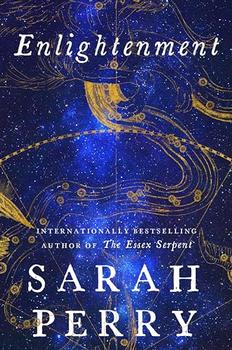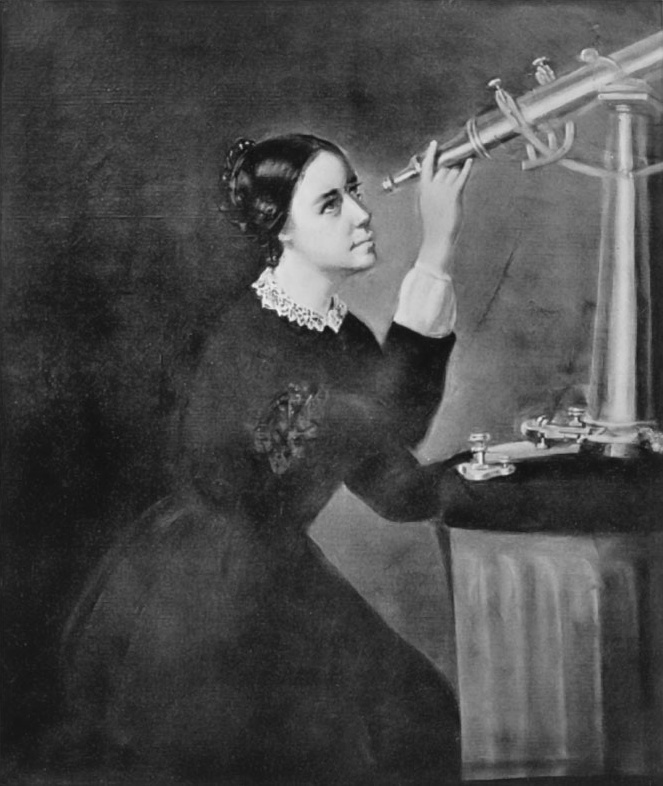Summary | Excerpt | Reading Guide | Reviews | Beyond the Book | Read-Alikes | Genres & Themes | Author Bio

A Novel
by Sarah PerryThis article relates to Enlightenment
 The central mystery of Sarah Perry's Enlightenment concerns an astronomer, Maria Văduva, and Thomas's uncovering of her hidden scientific contributions. Many real-life historical women partook in exploration of the night sky and space only for their discoveries to be similarly buried or forgotten. One such woman was the nineteenth-century astronomer Maria Mitchell.
The central mystery of Sarah Perry's Enlightenment concerns an astronomer, Maria Văduva, and Thomas's uncovering of her hidden scientific contributions. Many real-life historical women partook in exploration of the night sky and space only for their discoveries to be similarly buried or forgotten. One such woman was the nineteenth-century astronomer Maria Mitchell.
Mitchell was the first American astronomer to discover a comet. She was born on August 1, 1818, the third eldest of ten children, to William and Lydia Mitchell in Nantucket, Massachusetts. As Quakers, Mitchell's parents believed in equal education for all children regardless of gender, in a time when the schooling of girls was highly limited, and sent her to Cyrus Peirce's School for Young Ladies. By the age of twelve, Mitchell was able to help her father, an astronomer and teacher, with calculating their home's location through observations of a solar eclipse. By fourteen, she was rating chronometers for ships' whaling voyages. She graduated from school at sixteen, and went on to found her own school for teaching girls science and math.
In addition to the personal role Mitchell's father played in nurturing his daughter's aptitude for science, the two had a collaborative professional relationship well into her adulthood. In 1836, she became librarian of the Nantucket Atheneum. Nearby, on Pacific Bank, her father served as the principal officer of an observatory he built, and for twenty years, Mitchell spent her nights there with him, studying the sky.
On October 1, 1847, at the age of twenty-nine, Mitchell, using a two-inch telescope, discovered a comet, which was later named after her as "Miss Mitchell's Comet." Subsequently, King Frederick VI of Denmark awarded her a gold medal prize. In 1848, she was the first woman elected into the American Academy of Arts and Sciences. Later, she was elected to the American Association for the Advancement of Science, as well as the American Philosophical Society. Mitchell also became the first woman to work for the federal government by computing the ephemeris of Venus for the US Nautical Almanac.
But Mitchell did not rest easy on her laurels. She was active in the anti-slavery and suffrage movements, and advocated for educational access for the girls and women who came after her. Following the Civil War, Mitchell was invited to join the faculty of newly founded Vassar College. There, she gained access to advanced equipment and specialized in the surfaces of Jupiter and Saturn. In opposition to the social conventions of the time, she led her female students in class work at night and invited the day's leading feminists to lecture on politics. The research of Mitchell and her students broke into academic journals traditionally reserved for the scholarship of men.
In 1873, Mitchell served as president of the American Association for the Advancement of Women and was elected vice president of one of the era's rare mixed-gender professional associations, the American Social Science Association. In 1876, she gave her iconic "The Need of Women in Science" speech. In it, she elevated the domestic labor of women, citing it as indicative of their potential for scientific contribution — "When I see a woman put an exquisitely fine needle at exactly the same distance from the last stitch which that last stitch was from its predecessor, I think what a capacity she has for an astronomical observer; unknowingly, she is using a micrometer — unconsciously she is graduating circles."
Mitchell died in 1889 and was buried in her family's plot at Nantucket's Prospect Hill Cemetery, but her legacy lived on through her contributions to astronomy and the accessibility of science, as well as the memories of her beloved students.
Portrait of Maria Mitchell by H. Dassell, 1851, via Wikimedia Commons
Filed under People, Eras & Events
![]() This article relates to Enlightenment.
It first ran in the June 19, 2024
issue of BookBrowse Recommends.
This article relates to Enlightenment.
It first ran in the June 19, 2024
issue of BookBrowse Recommends.
Your guide toexceptional books
BookBrowse seeks out and recommends the best in contemporary fiction and nonfiction—books that not only engage and entertain but also deepen our understanding of ourselves and the world around us.